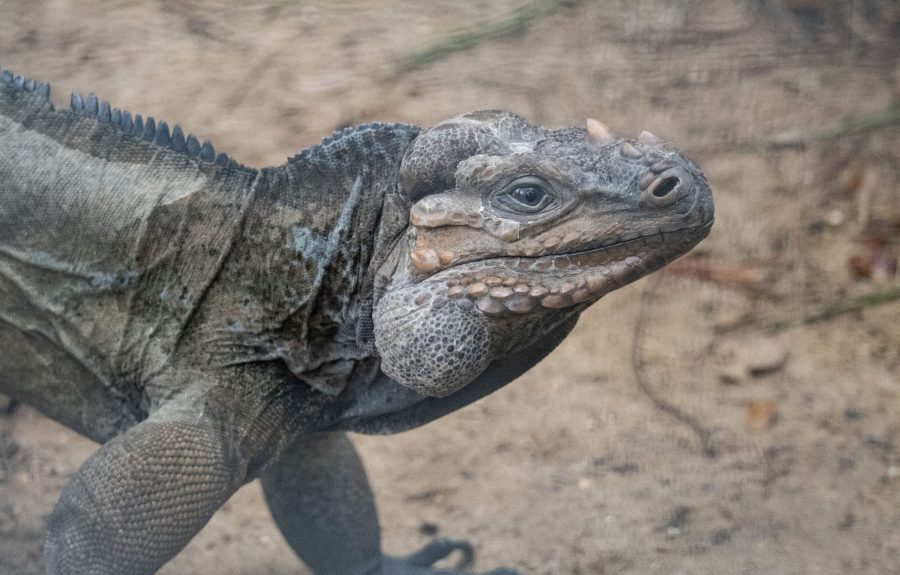

Can you spot the physical feature that gives Rhino her iconic name?
Big name, little horn — our latest arrival may sound like they have an iconic African relative, but this cold-blooded critter is all scales. Meet Rhino, our 16-year-old rhinoceros iguana who joined our Ambassador Animal team. As an Ambassador, Rhino will help educate guests on the importance of her species through special educational programs.
Rhinoceros iguanas are endemic to the Caribbean island of Hispaniola, meaning they are found nowhere else on Earth. These gray-colored reptiles get their name from the distinctive bony growth on their snouts that resemble a rhinoceros horn. They play an important role as seed dispersers by consuming and fertilizing the seeds of native vegetation, which helps spread plants to new areas and benefits the ecosystem.
Unfortunately, this species is endangered and has a decreasing population due to habitat loss, illegal hunting and introduced predators. These continued threats make Rhino’s job as an Ambassador Animal all the more important.
“By meeting Rhino, visitors can learn how conservation efforts and everyday choices can help protect these remarkable reptiles and the fragile island ecosystems they call home,” said Curator of Animals, Madison.
Madison worked with Rhino for over seven years at another zoo where she got to experience Rhino’s outgoing personality. She was thrilled when presented with the opportunity to once again work with her.
“Rhino is a particularly personable iguana who appears to enjoy human interaction,” said Madison. “I jumped at the chance to bring her to our Zoo, knowing she would be a great addition to our team!”
Like many other members of her species, Rhino has a calm and curious demeanor. But don’t be fooled — she’s got a sassy side, too, and isn’t shy about showing it when she wants her own space.
“Her mix of charm and attitude makes her a perfect reminder that reptiles can be just as expressive and full of character as any other animal,” noted Madison.
Rhino has been settling in well in her new home. She has been exploring her habitat and meeting her new keepers. The team has already begun working on different training exercises with her that will boost her comfortability when it’s finally time to head out on educational programs. We will be working at Rhino’s pace and looking for specific behavioral cues to ensure that Rhino feels confident and safe in our program spaces and in front of crowds. So far, Rhino has been very curious and interested in investigating new spaces.
“Working with Rhino is such a rewarding experience!” said Madison. “As someone who loves reptiles, it’s a joy to train her as she is always eager to engage.”
Reptiles, from snakes to turtles to iguanas like Rhino, often get a bad rap. We understand why some people get jumpy around certain cold-blooded creatures, but we’re glad to now have Rhino on our team to help guests build connections with these fascinating animals and learn why protecting these species matters.
Brevard Zoo is an independent, not-for-profit organization that receives no recurring government funding for our operating costs. Your generous support enables us to continue to serve our community and continue our vital animal wellness, education and conservation programs.
We would like to thank the following generous donors for supporting our mission-based programs:
Flammio Financial Group · Stifel- Garvin Wealth Management Group · Artemis IT · Pepsi Bottling Company · Amazon · PCL Construction | Nassal | MEC | Heard